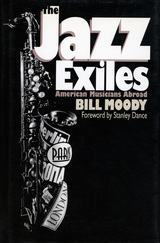3 books about Moody, Bill

Jazz Exiles
Bill Moody
University of Nevada Press, 2000
The Jazz Exiles chronicles the expatriate movement of American jazz musicians during the post-World War II era. While the term "exiles" normally conjures up images of ousted Third World leaders or deposed kings, it is as much a part of the jazz vocabulary as improvization or Birdland. Like the American writers of the 1920s who went to Europe and became Gertrude Stein's "lost generation", jazz musicians from the United States also made the Atlantic crossing at a steadily increasing rate until many of the major names in jazz lived or worked almost exclusively abroad. Throughout "The Jazz Exiles", the musicians speak for themselves in describing their motivation for joining the exodus to Europe which is now regarded as the third largest migration in jazz history. The exiles include many of the biggest names in jazz - Dexter Gordon, Johnny Griffin, Phil Woods, Coleman Hawkins, Louis Armstrong, Stan Getz, Benny Carter, and Bud Powell, among others. This work also assesses the impact of foreign residence on the careers of these musicians and on the history of jazz. Moody, a jazz musician himself, charts the movement of American musicians to Europe from a historical perspective and examines the exile experience from a number of sociological and economic viewpoints, all of which are factors in understanding jazz history. With stories narrated through personal interviews in the musicians' own words, "The Jazz Exiles" aims to shed new light on America's attitude toward its own original art form and examines the dilemma of the American artist both at home and abroad. Jazz aficionados, rhythm and blues fans - in fact, anyone who appreciates American music - should read the stories of these jazz exiles. "
[more]

A Key to the World
Victor Abbou
Gallaudet University Press, 2021
Victor Abbou is an invaluable witness to the period in France which is called the Deaf Awakening. His story is a treasure trove of archival material of that period, as he was one of the trailblazers in so many fields: actor, activist, trainer and teacher of future interpreters studying at the university. In doing all of this, he created bridges between two worlds, the world of the deaf and the world of the hearing, which were in close proximity but which were separated by a great chasm. Victor's story also shines a light on the key role played by several Americans who contributed significant sparks which ignited the French Deaf Awakening. This Franco-American connection in contemporary Deaf history is yet another bridge which Victor Abbou's story documents in great detail.
Published by Eyes Editions.
Includes links to two hours of video in International Sign.
Published by Eyes Editions.
Includes links to two hours of video in International Sign.
[more]

A Key to the World
Victor Abbou
Gallaudet University Press, 2021
Victor Abbou is an invaluable witness to the period in France which is called the Deaf Awakening. His story is a treasure trove of archival material of that period, as he was one of the trailblazers in so many fields: actor, activist, trainer and teacher of future interpreters studying at the university. In doing all of this, he created bridges between two worlds, the world of the deaf and the world of the hearing, which were in close proximity but which were separated by a great chasm. Victor's story also shines a light on the key role played by several Americans who contributed significant sparks which ignited the French Deaf Awakening. This Franco-American connection in contemporary Deaf history is yet another bridge which Victor Abbou's story documents in great detail.
Published by Eyes Editions.
Includes links to two hours of video in International Sign.
Published by Eyes Editions.
Includes links to two hours of video in International Sign.
[more]
READERS
Browse our collection.
PUBLISHERS
See BiblioVault's publisher services.
STUDENT SERVICES
Files for college accessibility offices.
UChicago Accessibility Resources
home | accessibility | search | about | contact us
BiblioVault ® 2001 - 2024
The University of Chicago Press









